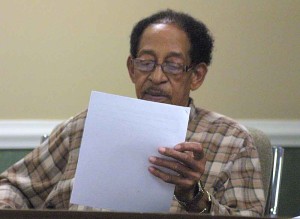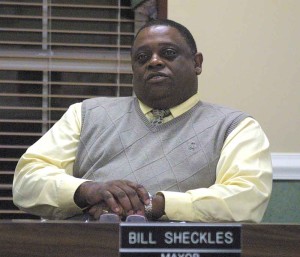City council, public voice concerns on mayor’s proposed municipal order
By JIM BROOKS
Nelson County Gazette

Councilman Francis Lydian looks over the proposed Municipal Order during a discussion of its merits at Tuesday’s working session of the Bardstown City Council. Click to enlarge.
Thursday, Nov. 7, 2013, 2 a.m. — The Bardstown City Council’s working session Tuesday night ran more than 2-1/2 hours as the council discussed a number of issues it will consider at future council meetings.
MUNICIPAL ORDER 2013-19. The issue that brought most of the 35 audience members to the working session was Municipal Order 2013-19, an order that would create tightly defined rules governing how council meetings are conducted.
The council received the draft of the order the Friday before their last city council meeting. The concerns the council expressed at the working session were an extension of most of their initial concerns with Mayor Bill Sheckles’ proposal.
- Click here to download a PDF copy of Municipal Order 2013-19 (a new window will open).
“I don’t think we need those guidelines,” Councilman Francis Lydian told the council. “In the past we haven’t had problems, and I don’t think it is necessary.”

Bardstown Mayor Bill Sheckles listens to city council discussion about Municipal Order 2013-19. Click to enlarge.
Sheckles told Lydian the council isn’t required to adopt the order, but the guidelines in it are for the council’s benefit.
“If there was ever a time you were challenged as to how the meetings are run, you have this to fall back on,” he explained. “It’s not something I wanted to ram down your throats, but it never hurts to have guidelines.”
The order’s intent isn’t to keep people from speaking at council meetings if they contact city hall in advance, he explained.
Councilman Tommy Reed agreed that guidelines for meetings is a good idea, and he gave an example of someone who was unruly at a council meeting who needed to escorted out of the meeting by police. “You want to be prepared for it with a decorum,” he explained.
Reed noted the municipal order’s meeting agenda guidelines lacked provisions for giving the public an opportunity to speak. “I think the citizens should be provided a reasonable opportunity to address the council on any agenda item,” he said.
Reed said he also didn’t like the order’s provision for limits on council discussions. He gave an example of the smoking ban debate, when a lot of people asked to speak on the subject. He said in an instance like that, it would be reasonable to limit public comments in order to allow all to speak.
Councilman John Royalty also chaffed at the provisions for limiting council discussions and public input — as long as the discussions are relevant. “If they go off talking about another county, unicorns or something like that, we don’t need to hear that,” he said.
Reed said the guidelines could be flexible and allow the presiding officer or council to allow longer discussion.
Royalty noted the No. 1 item on the council agendas prior to the Oct. 22nd meeting was to recognize individuals and delegations who wished to speak to the council. That item was missing from the Oct. 22, 2013, council agenda, the meeting where council first discussed the municipal order.
Sheckles said he never refused a request to be placed on the agenda by anyone who wished to address the council. If it is necessary to remove someone from a future meeting, the council can fall back on the guidelines in the municipal order.
“That’s all this is, it’s just guidelines,” Sheckles said. “We’re all going to use common sense.”
Bardstown resident Mark Ballard said he understood the need for an orderly meeting, but not if the rules restricted the public’s right to speak.
“Nobody needs to come in here an use curse words or make threats,” he said. Free speech is important because it is the only recourse the public has to make their concerns known. Ballard referred to a local newspaper story he said made the order sound like it would allow the mayor to dictate who could speak, when, and what topic. If the mayor didn’t want to hear it, the individual wouldn’t be allowed to speak.
“Maybe you need to address the Standard about that,” Sheckles said.
“You all need to remember that the fact that you work for the citizens of this town, we don’t work for you,” Ballard said. Making people give a day’s notice to get on the agenda in order to speak to the council “basically is crap,” he said.
Councilman Roland Willams said he felt it was his responsiblity to allow citizens to speak before the council. He was also concerned about setting time limits in the order. If there’s an issue that people are concerned about, any guidelines should have the flexibility to allow the council to give people a chance to speak.
“Taxpayers should have the opportunity and the right to speak on an issue as long as they do it in a civil manner,” he said.
Sheckles said the time limits would be adjusted on a case-by-case basis.
“Don’t think your rights are being stomped on if we do put some limits in there,” Reed said, referring to the municipal order. He agreed it was important to have public comment on the meeting agenda.
Royalty argued the public should have a chance to speak regardless of the what the mayor or council think of their message — as long as it done in a civil manner. He noted the omission of the long-standing public recognition agenda item from the Oct. 22nd council agenda and called for its return.
“By taking that section out, I think you’re cutting the public out,” Royalty said.
“When have they not had a right to talk?” the mayor asked
Royalty referred to four people who had been denied a chance to speak at earlier meetings, two of whom he said were at the Oct. 8th council meeting. “But that was your call,” he said to Sheckles. “You didn’t want to recognize them, and that’s your call.”
Sheckles said he recognized them, but he based his actions on the fact he didn’t want to waste the council’s time on an issue that isn’t a council issue.
Bardstown resident Al Brown Sr. cautioned the council against implementing rules could be used in the future to restrict the public’s right to speak before the council. “I think we should think ahead, five, 10, 15 years,” he said.
Bobby Simpson said he didn’t see a problem with the way council meetings have operated, but he said it might be worthwhile to form a committee to examine the issue.
“I don’t want to be part of not listening to the people,” Simpson said.
“The people put me here, and I think the people should be able to bring things up to the council,” he explained. “I’m not for this.”
-30-






